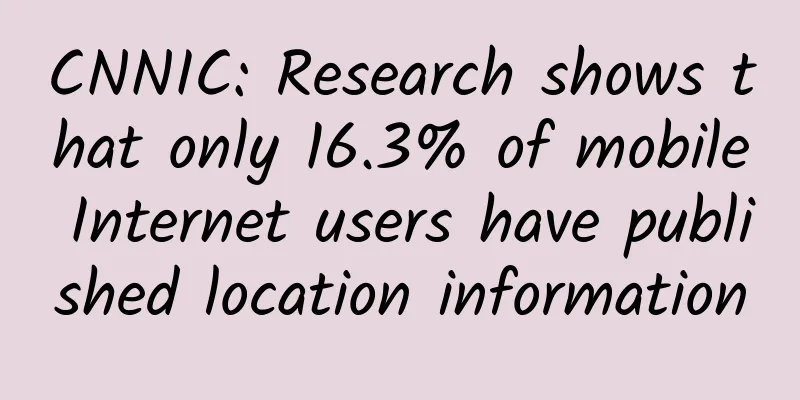CNNIC: Research shows that only 16.3% of mobile Internet users have published location information

|
As of December 2012, the number of mobile Internet users has grown rapidly, reaching 420 million. With the widespread popularity of smart phones, mobile Internet has achieved rapid growth in 2012. Mobile Internet applications and services continue to emerge, promoting the prosperity of mobile Internet. The integration of "social + location + mobile" represents an important direction for the future development of the Internet. Location information is crucial to the development of mobile Internet and is one of the important features that distinguish mobile Internet from traditional Internet. Geographic location information is extremely important to enterprises and brings great development prospects for user behavior mining and mobile Internet advertising. Mobile Internet users pay more attention to the privacy protection of location information and are less willing to actively share location information. According to a CNNIC survey, only 16.3% of Internet users have published their current location information, and among those who have published, 7.3% regret this behavior. Figure 1: Have mobile Internet users published their location information? Young netizens are more willing to share various location information. According to a CNNIC survey: the proportion of mobile netizens under the age of 30 who have posted current information is over 20%, which is higher than the overall average, indicating that the generation of young people who grew up in the Internet age are relatively open-minded in sharing various information. Figure 2 Proportion of mobile Internet users of different ages who publish their current location information The proportion of users actively sharing location information is not high, but the phenomenon of mobile Internet service providers collecting user location information is common. On the one hand, when users use mobile applications, they will publish their location information in exchange for corresponding applications and services. For example, when users use WeChat to find people nearby, they will retain their location information for a period of time; when users use Dianping.com, they will submit their geographic location information in exchange for services. On the other hand, mobile application service providers will actively collect information such as user locations that are not related to their services, which may be suspected of collecting user privacy without authorization. Users are more sensitive to this way of collecting location information. For users to enjoy more convenient mobile Internet services, it is essential to actively or passively publish location information. How to strike a balance between protecting user location privacy and collecting user location information may require more legal regulation. |
<<: Can adult skin care products be used on children?
Recommend
What causes blood clots during menstruation?
Menstruation is a normal physiological problem th...
Causes of ovulatory bleeding after abortion
Many women experience ovulation bleeding after ch...
What are the causes of ectopic pregnancy?
The real name of ectopic pregnancy is ectopic pre...
Unpleasant odor in the lower body during late pregnancy
In the late stages of pregnancy, if there is an o...
My boyfriend said I'm loose down there
After giving birth, a woman's vagina will bec...
How can skipping prevent ectopic pregnancy?
When it comes to ectopic pregnancy, we should all...
Can pregnant women spray athlete's foot medicine?
Pregnant women cannot take medicine at will durin...
Lochia has a smell
The reason why lochia has a smell is because the ...
Breast hyperplasia massage method steps
When a woman is breastfeeding, she must prevent t...
[Fat Bear Science] Bleeding? Infection? Malnutrition? How do cancer patients manage themselves? This article explains
The main reason why people are afraid of cancer i...
Follow-up after intrauterine adhesion separation
In fact, many diseases require follow-up visits a...
Is it good for pregnant women to drink too much water?
Many women often feel thirsty during pregnancy, s...
How long can you live with early breast cancer?
It has to be admitted that breast cancer has inde...
The best time to treat uterine prolapse
Many women find that their uterus has prolapsed a...
What shampoo is good for pregnant women with dandruff?
During pregnancy, pregnant women are often very d...









